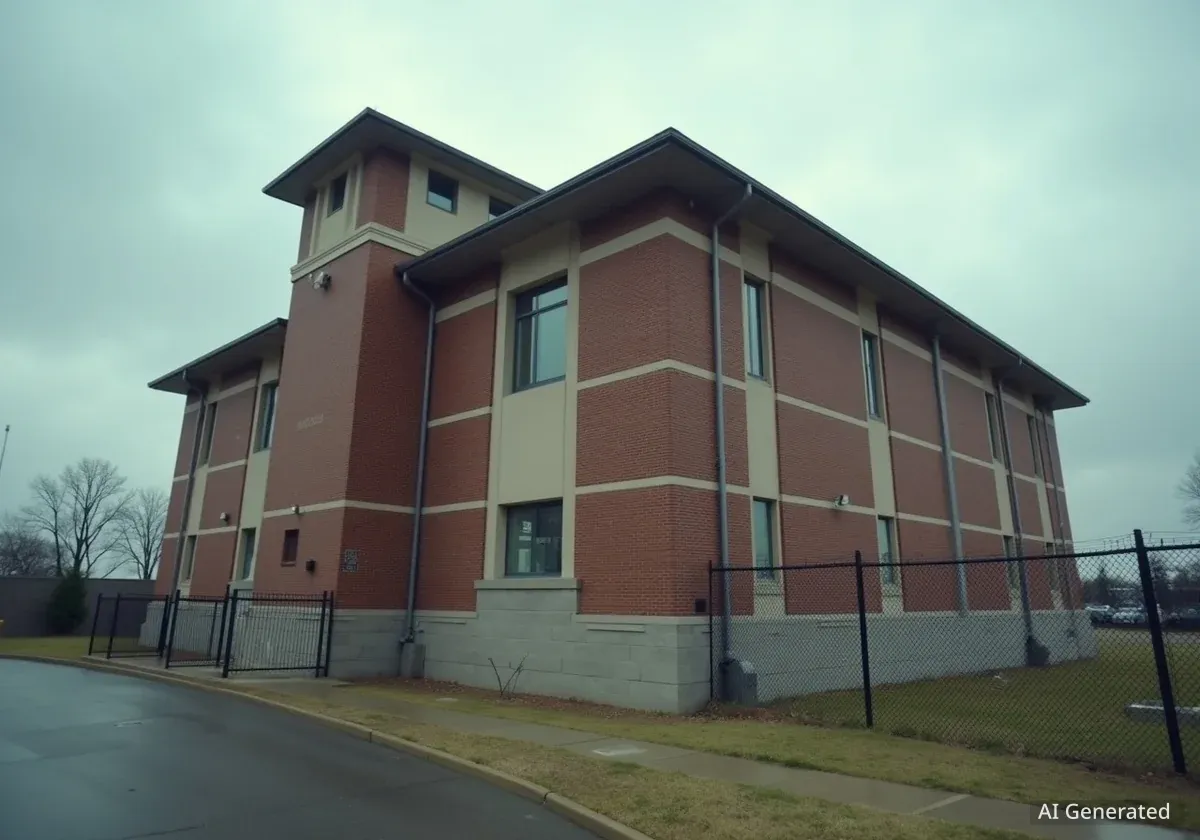U.S. Immigration and Customs Enforcement (ICE) has formally proposed an agreement with Carbon County, Pennsylvania, to house immigration detainees at the local correctional facility. County officials are now evaluating the proposal, raising significant questions about financial responsibility, legal liability, and the potential impact on the local community.
The proposition was detailed by Josh Reid, an assistant field office director for ICE, during a Carbon County Prison Board meeting. The plan aims to address logistical challenges faced by the agency in northeastern Pennsylvania.
Key Takeaways
- ICE has approached Carbon County to use its jail for housing immigration detainees due to the long travel distance from Allentown to its Pike County detention center.
- The proposal suggests housing male detainees for up to 72 hours and female detainees for longer periods, potentially up to a year.
- Carbon County officials expressed concerns regarding medical costs, legal liability in case of lawsuits, and the potential for protests in the community.
- No decision has been made; the county has requested a sample contract for review and more information on community safety measures.
ICE Proposal Aims to Solve Logistical Hurdles
U.S. Immigration and Customs Enforcement is looking to establish a partnership with Carbon County to use its jail as a temporary holding center. According to ICE Assistant Field Office Director Josh Reid, the agency's primary detention facility is located in Pike County, a significant distance from key enforcement areas like Allentown.
"We have a very limited amount of staff in that office (in Pike) and they’re responsible for covering most of northeastern Pennsylvania," Reid explained to the prison board. He noted that this large territory makes operations difficult, particularly when transporting detainees from the Lehigh Valley.
Details of the Housing Agreement
The proposed contract outlines different terms for male and female detainees. Male detainees would be held at the Carbon County facility for a maximum of 72 hours before being transferred. Female detainees, however, could be housed for much longer periods—from a week to a year—due to a shortage of female bed space across Pennsylvania, Delaware, and West Virginia. This would allow them to undergo immigration proceedings while in Carbon County.
Reid specified that the detainees would typically be considered low-level offenders, although some medium-level cases could also be housed depending on transportation and individual circumstances.
County Officials Raise Financial and Liability Concerns
The prison board immediately sought clarification on the financial and legal implications of such an agreement. Commissioner Rocky Ahner questioned who would be responsible for the medical expenses of detainees, as they would not be county inmates.
"How it works," Reid responded, "is we have immigration health service forms so any detainee of ours that needs any type of outside treatment, it has to be approved by doctors with them. Once it’s approved, yes, we cover it."
He added that while Carbon County would need to provide guards for hospital visits, the hours for that service would be billable to ICE. The daily rate for housing a detainee has not been finalized, but Reid mentioned the rate in Pike County is over $100 per day.
Potential for Legal Challenges
County Solicitor Bob Frycklund raised a critical point about legal liability, particularly regarding potential lawsuits for unlawful detention. He expressed concern that the county could be named in lawsuits even if the detainees are officially in ICE custody.
Reid assured the board that in his 20 years of experience, he has never seen a county held liable for holding an individual on an ICE detainer, stating that the U.S. Attorney's Office would represent such cases.
Despite these assurances, Frycklund remained cautious, noting that in such lawsuits, "everybody involved gets sued." This legal uncertainty is a major point of consideration for the county.
Community Impact and Security at Forefront of Discussion
Beyond the legal and financial aspects, county officials voiced strong concerns about the potential impact on the local community, especially in Nesquehoning, where the jail is located.
"While I support ICE and everything you are doing out there... I do have concerns when you bring that element into a community," said Commissioner Mike Sofranko. He questioned whether the borough's police department could handle a large-scale incident or protest, given the existing law enforcement shortages in the county.
Sofranko articulated a fear that the facility could become a focal point for political activism.
"I’m not going to sit here and play games. We’re a magnet for protests for everything," he stated, adding, "I don’t know if we’re adequately prepared for that onslaught or what may come."
Commissioner Wayne Nothstein echoed these sentiments, citing the current "political climate" as a reason for concern. The board also questioned why ICE does not have similar agreements with Lehigh or Northampton counties, which are geographically closer to Allentown. Reid confirmed no such contracts exist with those counties.
Next Steps: Review and Deliberation
The meeting concluded without any formal action being taken. The county board requested that ICE provide a tentative contract, similar to the one used in Pike County, for a thorough review by their legal team.
Officials also asked for any information ICE could provide to help reassure residents of their safety should the county proceed with the agreement. The board emphasized that its primary duty is to protect the interests and safety of Carbon County residents.
"We’re here to support you, but we need to make sure Nesquehoning doesn’t bear the brunt of something that they don’t need," Sofranko concluded, highlighting the board's cautious approach to the federal agency's request.





